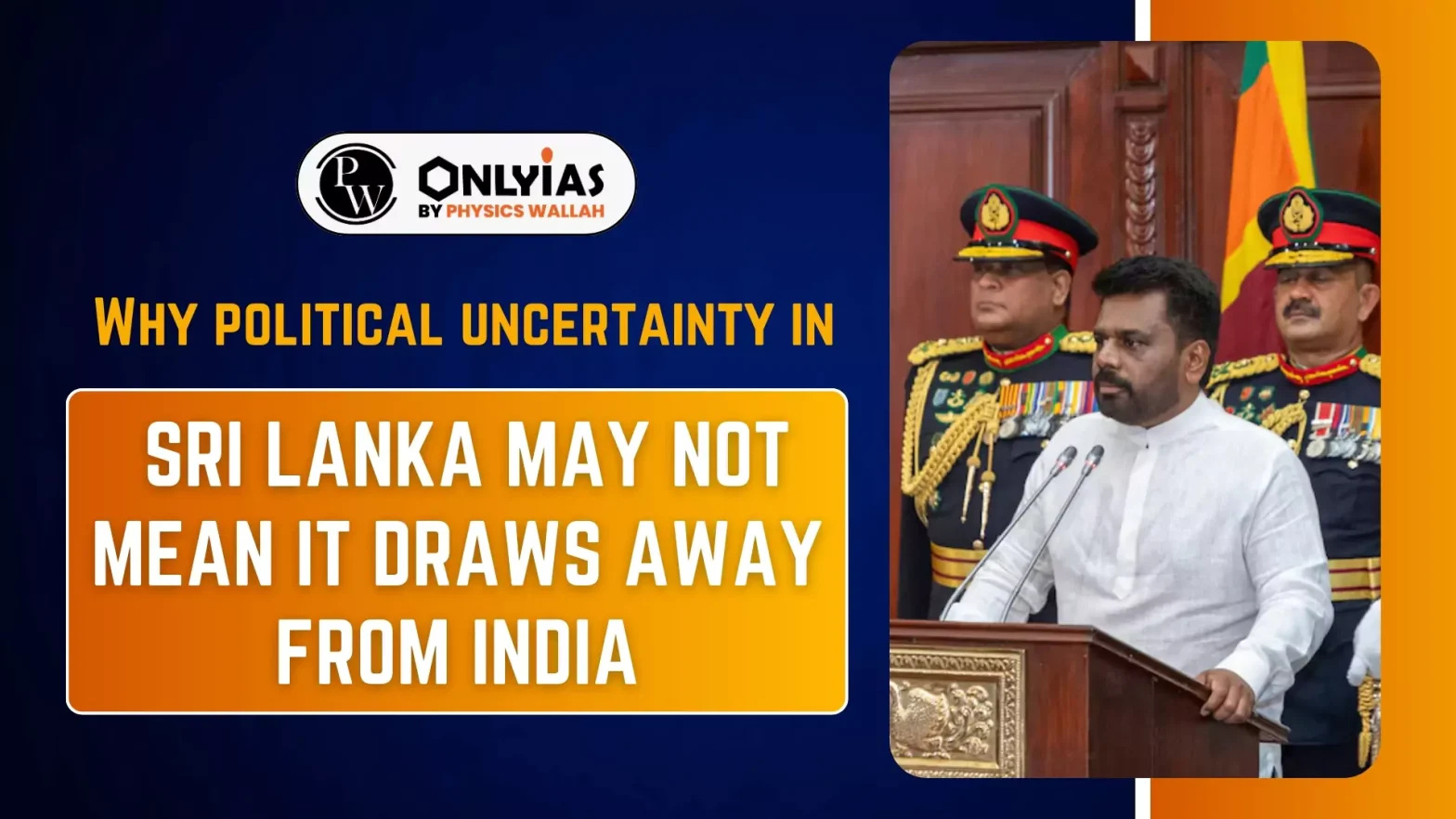In 2024, India’s Neighbourhood First Policy encountered significant challenges. The election of Anura Kumara Dissanayake in Sri Lanka marked a departure from mainstream politics, complicating bilateral ties. Meanwhile, Pakistan’s intensification of cross-border terrorism continued to strain relations. In Nepal, K P Oli’s return to power raised concerns about deteriorating diplomatic engagement. Additionally, Bangladesh saw anti-government protests against Sheikh Hasina, prompting her to seek refuge in India and sparking apprehensions about India’s perceived involvement. Coupled with instability in the Northeast and the emergence of radical elements, these developments create a precarious landscape for India’s foreign relations.
About National People’s Power (NPP)
- The National People’s Power (NPP), or Jathika Jana Balawegaya (JJB), is a socialist political alliance in Sri Lanka, founded in 2019 by Anura Kumara Dissanayake of the Janatha Vimukthi Peramuna(JVP).
- The alliance gained prominence when Dissanayake was elected president in 2024, receiving 42.31% of the preferential votes.
- The National People’s Power (NPP) is supported primarily by the Sinhalese majority community in Sri Lanka.
- The JVP has changed its approach and now focuses on politics instead of its violent history. In the past, it was a left-wing group involved in two major uprisings in 1971 and 1987, during which it held strong anti-India views like many nationalist groups in the region. Today, the JVP is trying to shed its violent image and engage more peacefully in the political process.
|
Enroll now for UPSC Online Classes
Significance of NPP Coming to Power
- Shift in Political Dynamics: In the 2020 parliamentary elections, the National People’s Power (NPP) aimed to outpace the ruling Sri Lanka Podujana Peramuna (SLPP) and secure a parliamentary majority. However, the SLPP won a landslide victory, and the Samagi Jana Balawegaya emerged as the main opposition, while the NPP only obtained 3 seats, remaining a third party.
- Reason for overnight change: During the COVID-19 pandemic, Sri Lanka faced numerous challenges, particularly in tourism. In response, India and the IMF offered loan assistance, but the IMF imposed conditions that required Sri Lanka to increase taxes, simplify business processes, and abandon its free economic policies. The stringent conditions imposed by the IMF during the national unity government led by Gotabaya Rajapaksa created a challenging environment for the NPP. Anura Kumara Dissanayake effectively tapped into national sentiment against these policies, which became a key factor in his success. Dissanayake’s government emerged from public frustration with corruption and economic mismanagement.
- Economic Concerns: Dissanayake’s administration may bring instability to the Sri Lankan economy, as he has hinted at renegotiating the terms of the International Monetary Fund (IMF) support, which could complicate relations with international financial bodies. His government has also threatened to cancel significant projects, such as the solar power initiative by India’s Adani Group and the extensive Colombo port project supported by the US International Development Finance Corporation. These developments pose a risk to India’s investments in the region, which are vital for both economic and geopolitical interests.
Impact of Dissanayake’s Arrival on India-Sri Lanka Relations
The Modi government faces scrutiny for its perceived over-reliance on Sheikh Hasina’s administration in Bangladesh, often sidelining other political entities, such as the opposition Bangladesh Nationalist Party and the anti-Indian Jamaat-e-Islami. This narrow diplomatic focus has implications for India’s broader engagement strategy in the region, particularly with neighboring countries like Sri Lanka. The election of Anura Kumara Dissanayake and his National People’s Power (NPP) introduces a new dynamic in Sri Lanka’s political landscape. Here are the potential positive and negative impacts on India-Sri Lanka relations:
Positive Aspects
- Acknowledgment of India’s Role: Dissanayake has publicly recognized India’s significance for Sri Lanka’s security and economic stability. His government’s openness to maintaining dialogue with India signals a potential for enhanced bilateral cooperation.
- Economic Interdependence: Given the substantial Indian investments in Sri Lanka, including infrastructure projects and support during economic crises, Dissanayake’s administration may prioritize continuing these engagements to stabilize the economy. This economic interdependence could act as a buffer against political upheaval.
- Balanced Foreign Policy: Dissanayake is likely to pursue a balanced approach in foreign relations, avoiding an overt tilt towards China. Such a strategy would benefit India, as it seeks to maintain influence in the region amidst growing Chinese presence.
- Potential for Reform: With a fresh mandate, the NPP could bring innovative policy ideas that may resonate well with India’s development goals, especially in sectors where India has significant stakes.
Negative Aspects
- Populism and Economic Risks: Dissanayake’s populist policies, while appealing to the electorate, could jeopardize Sri Lanka’s economic recovery. If his government adopts radical economic measures or renegotiates existing agreements, it could destabilize critical projects involving Indian investment.
- Domestic Political Pressure: Facing pressure from nationalist sentiments and historical grievances against India, the NPP could adopt a more cautious or confrontational stance toward India to appease domestic critics, potentially straining relations.
- Increased Influence of Radical Elements: The NPP’s alliance with left-wing ideologies could inadvertently empower radical factions within Sri Lanka, which historically harbored anti-Indian sentiments. This could lead to increased public resentment against India, complicating diplomatic relations.
Check Out UPSC NCERT Textbooks From PW Store
Conclusion
India must recognize that its relationships with neighboring countries are interlinked rather than isolated. A comprehensive neighbourhood strategy is essential, focusing on the unique characteristics and needs of each country while promoting regional economic integration. India should identify:
- Assets: Opportunities for collaboration in trade, infrastructure, and technology.
- Liabilities: Challenges such as historical tensions, nationalistic sentiments, and external influences.
By leveraging its role as an engine of growth, India can position itself as a key player in regional transport and communication networks and lead collaborative efforts to tackle pressing issues like climate change.
![]() 25 Sep 2024
25 Sep 2024
